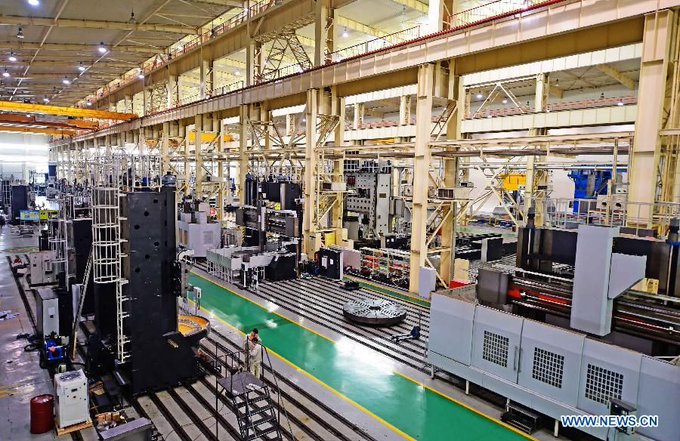HOME >> BUSINESS
China's Manufacturing PMI falls due to global economic slowdown
By Chi Jingyi Source:Global Times Published: 2019/10/31 13:08:40

The purchasing managers' index (PMI) for China's manufacturing sector fell to 49.3 in October from 49.8 in September. Photo: Xinhua
China's Purchasing Managers' Index (PMI) for the manufacturing sector came in at 49.3 in October, compared to 49.8 in the previous reading, according to the National Bureau of Statistics (NBS) on Thursday.
Analysts say the decline was due to seasonal factors. China's economic growth remains stable though the drop was larger than expected, indicating greater downward pressure on the economy.
A PMI reading above 50 indicates expansion, while a reading below reflects contraction.
Zhao Qinghe, senior statistician of the NBS, on Thursday said that the drop in PMI is also a result of the foreign market's recession.
"Manufacturing PMI fell in all major economies," Liu Jianying, an associate research fellow at the Chinese Academy of International Trade and Economic Cooperation of the Ministry of Commerce (MOFCOM), told the Global Times on Thursday.
"The drop in the PMI of major economies shows that the global economy is slowing down," Liu Jianying added.
The US' manufacturing PMI fell sharply in September to 47.8, its lowest level since 2009, and the eurozone's manufacturing PMI read 45.7 in the same month, its lowest level since October 2012
Liu said that the growth power of the Chinese economy remains stable, and the economy is moving steadily toward high-quality development as China's gross domestic product (GDP) grew 6.2 percent year-on-year in the first three quarters - the fastest growth of all major economies globally.
High-tech manufacturing, equipment manufacturing and consumption-related sectors maintained remained in the expansion zone, according to NBS data.
Zhao noted that continued progress was made in industry transformation and upgrading, and that the confidence of enterprises remains stable.
The production indexes of 13 sectors were in the expansion zone, from a total of 21 surveyed sectors. Industries including textiles, chemical fibers, rubber and plastic, special equipment and computer communications equipment fell into the high boom range above 55.0.
Liu Xuezhi, a senior economist at the Bank of Communications, predicts that the producer price index (PPI) may continue to decline in the near future as purchase and factory prices have dropped significantly, and the prices at both ends of enterprise are weaker.
"There is downward pressure on the economy. China needs to step up counter-cyclical regulation and focus on expanding effective domestic demand to offset the low growth of global economy," Liu Xuezhi told the Global Times on Thursday.
In October 2019, the non-manufacturing PMI was recorded at 52.8, having fallen 0.9 percentage points from the previous reading, indicating an overall expansion in the non-manufacturing sector with a slower growth rate, said the NBS.
The rapid expansion of the aviation, railway transport, postal express, banking and insurance sectors, with each sub-index above 65, indicated that the confidence of service companies in future market development had been boosted, according to the NBS.
Posted in: ECONOMY